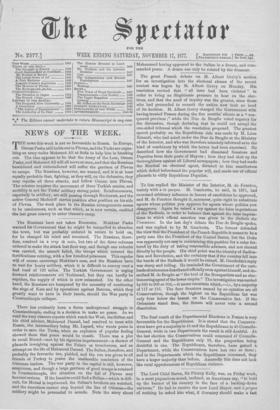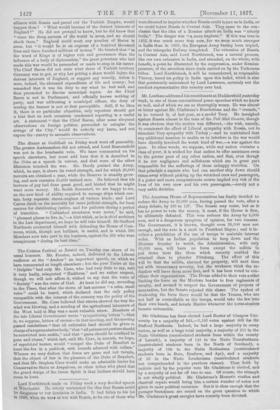The Lord Chief Baron, Sir Fitzroy Kelly, was, on Friday
week, in a most pugnacious mood, inclined, as Americans say, " to hold up the banner of his country in the face of a backing-down universe." He had to receive the new Lord Mayor, and a propos of nothing he asked him what, if Germany should make a fast
alliance with Russia and parcel out the Turkish Empire, would happen then ? " What would become of the dearest interests of England ?" He did not pretend to know, but he did know that "come the three corners of the world in arms, and we should shock them." England could meet any number of States in arms, but " it would be at an expense of a hundred thousand lives and three hundred millions of money." He trusted that " as the word of Kings is of higher rule and governance than the influence of a body of diplomatists," the great potentate who had made this war would be persuaded or made to stop in his career. The Chief Baron did not state what share of Turkish territory Germany was to get, or why her getting a share would injure the dearest interests of England, or suggest any remedy, unless it were, indeed, the aforesaid expenditure of life and money ; but remarked that it was his duty to say what ho had said, and then proceeded to discuss municipal topics. As the Chief Baron is not in Parliament, and officially knows nothing of party, and was addressing a municipal officer, the duty of waving the banner is not at first perceptible. Still, if ho likes it, there is no particular objection, only reporters should get a hint that on such occasions condensed reporting is a useful art. A statement " that the Chief Baron, after some eloquent observations on foreign politics, proceeded to eulogise the sewage of the City," would do nobody any harm, and not expose the c ountry to sarcastic observations.







































